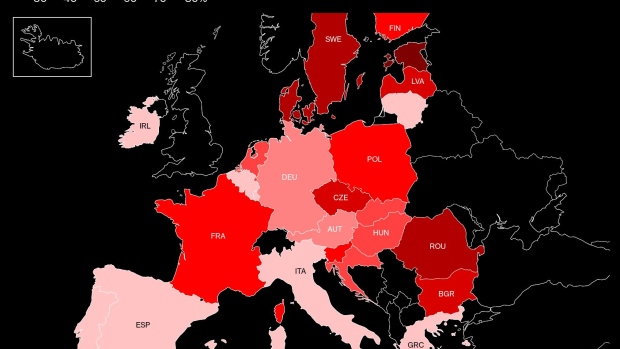Jan 18, 2022
Italy Mulls as Much as $4.5 Billion to Fight Soaring Power Bills
, Bloomberg News

(Bloomberg) -- Sign up for the New Economy Daily newsletter, follow us @economics and subscribe to our podcast.
Italy’s government is readying as much as 4 billion euros ($4.5 billion) to offer immediate help to consumers hit by energy prices, while it works on a wide range of longer term measures, people familiar with the matter said.
The aid won’t require parliament to authorize fresh debt, and can rely instead on other revenue streams such as carbon emission rights, the people said, asking not to be named discussing confidential plans. Details of the package still under review and might delay its approval until after Italy’s parliament starts voting on a new president on Jan. 24, according to the people.
The measures would come on top of around 1.5 billion euros of relief for industries hit by the latest pandemic restrictions, such as tourism, which may be approved as early as this week.
Read more: Italy Readies Small Pandemic Aid Package Without Extra Deficit
Europe is in the grips of one of the worst energy crunches in history, forcing politicians to step in. Prime Minister Mario Draghi’s government is already supporting struggling households with 8.5 billion euros through March.
But spending to keep energy costs under control is not a long-term option in the face of an estimated increase in power and gas bills in the first quarter of 55% and 42%, respectively.
Ecological Transition Minister Roberto Cingolani told lawmakers Tuesday that the government is studying different approaches to structurally abate energy costs for end users.
These include, among others:
- Securitizing some network charges, which are currently paid by consumers to finance, for example, the development of renewable energy sources
- Temporarily reducing incentives to solar energy by about 1.5 billion euros and to hydroelectric energy by 1-2 billion euros
- Boosting production from Italy’s existing gas fields
“These are possibilities that must be evaluated economically and legally,” Cingolani told Bloomberg in response to a question about the total value of the measure under study. “I think it’s impossible to use them all together.”
©2022 Bloomberg L.P.


